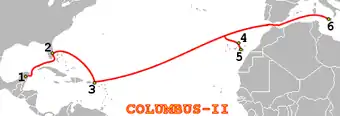Columbus II
COLUMBUS II is an optical, repeatered, transatlantic telephone cable. It is approximately 12,102 km (7,520 mi; 6,535 nmi) in length. It entered into commercial service in 1994.[1] The system, along with the Americas cable, was the first to use the Erbium-doped fiber amplifier (EDFA) as its optical amplifier repeaters.[2] In 2009, the transatlantic section was retired, and as of 2023, only the Columbus-II-B section remains in use and has been upgraded. [3]

It is in 3 segments has landing points in:
- Columbus II - A (1121 km) - 560 MB/s
1. Cancún, Mexico
2. West Palm Beach, Florida, United States
- Columbus II - B (2068 km) - 2500 MB/s
2. West Palm Beach, Florida, United States
3. Magens Bay, St. Thomas, U.S. Virgin Islands
- Columbus II - C (9116 km) - 560 MB/s
3. Magens Bay, St. Thomas, U.S. Virgin Islands
4. Funchal, Madeira, Portugal
5. Sardina, Gran Canaria, Spain
6. Palermo, Sicily, Italy
References
- Juggerst, Patrick (July 1995). "AT&T's Undersea Fiber-Optic Cable Systems". Sea Technology. Arlington, VA: Compass Publications, Inc. 36 (7): 29–30, 32–34.
- Repeatered Fiber Optic Submarine Systems. IGI Consulting (Report). Boston, MA: IGI Consulting, Inc. 1998. p. 27. Retrieved 14 June 2020.
- FCC. "Report No. SCL-00272" (PDF).